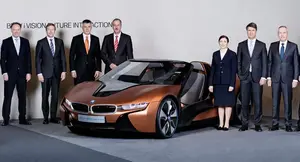
Four years after first displaying the i8 Spyder Concept, BMW will finally put it into production.
The official press release states that the upcoming i8 roadster will be added to the firm's portfolio of hybrid and electric vehicles, which will expand and will include an updated i3, with an increased battery capacity and longer range.
Details on both cars are scarce at the time, however, development of electrified BMW cars will include a total of seven models, which will be either purely electrically powered, just like the i3, or feature a combination of an electric motor and an internal combustion engine, in a plug-in hybrid form. These will be introduced "from 2016 onwards", as the Group explains, and will be joined eventually, "in the coming years", by a plug-in hybrid MINI.
Besides its satisfactory range of electrified vehicles, BMW will also continue to focus on the development of hydrogen fuel-cell technology. Its current test cars are able to achieve a range of up to 700 km (435 miles).
The BMW Group looks up to the future and promises to "ensure a leading role in automated driving". The firm's "Project i 2.0" will "cement its position as technological leader in this field" and will focus on high-def digital maps, cloud and sensor technology and artificial intelligence.
"With project i 2.0 we will lead the field of autonomous driving. We will turn research projects into new kinds of industrial processes, bringing future technology onto the road", said Member of the Board of Management responsible for Development, Klaus Frohlich.
BMW has already made a first step into this direction with the new 7-Series. The flagship sedan is equipped with five radar sensors and a stereo camera and it's able to maintain a safe distance to the vehicle ahead, up to 210 km/h (130 mph) on motorways, and it can drive itself into the garage, at the touch of a button, with Remote Control Parking.